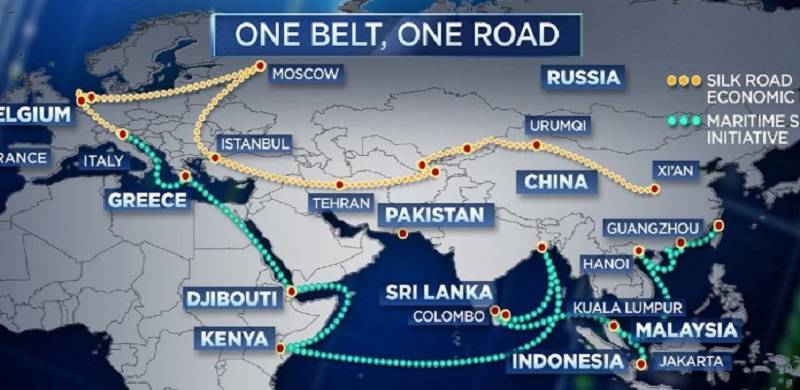
"Things are changing in the region [...] Belt and Road Initiative (BRI) is a transformational venture and can bring peace and development in the region. Considering BRI and CPEC a zero-sum game, we believe, is unwise.”
These were the views of Makhdoom Shah Mahmood Qureshi, Foreign Minister of Pakistan, at the inaugural session of the two-day international conference organized by the China-Pakistan Study Center (CPSC) at the Institute of Strategic Studies Islamabad (ISSI) in collaboration with PowerChina. The inaugural session was attended by President PowerChina, Mr. Du Chunguo and the Ambassador of the People’s Republic of China, H.E. Yao Jing.
Earlier, in his welcome remarks, DG ISSI Ambassador Aizaz Ahmed Chaudhry aptly sketched the changing dynamics of the region and said the new great power tussle, initiated mainly by the US, can either yield a new globalism or bring the old globalism to a halt altogether. He said that the Belt and Road Initiative (BRI) and China-Pakistan Economic Corridor (CPEC) can help us navigate the challenges of contemporary times.
In his introductory remarks, Director CPSC Dr. Talat Shabir emphasized that there is a need to hold debates and generate constructive ideas through research and collaboration.
President PowerChina Mr. Du Chunguo elaborated that his company has completed 40 power projects in Pakistan focusing on socio-economic development of the people.
Ambassador of the People’s Republic of China H.E. Yao Jing commended the efforts by the government of Pakistan in implementing CPEC. The Pakistani government, the Ambassador noted, has adopted an economy-oriented foreign policy. This, he remarked, was the right policy.
During the two sessions, the Chinese scholars predicted that CPEC would be a role model for other corridors of BRI. While emphasizing the importance of regional economic integration through BRI and CPEC, both Chinese and Pakistani intellectuals were skeptical of India’s claim to a peaceful rise and the Indo-Pacific strategy of the United States. Human resource development for launching SEZ projects; resolving bigger economic challenges like Pakistan’s fiscal debt and balance of payment, as well as following China’s poverty alleviation practices for socio-economic development in Pakistan were suggested as future imperatives.
The conference was an distinguished gathering comprising academia, the think-tank community and media figures from Pakistan and China. The participants at the two sessions on the first day included: Ambassador Masood Khalid, Ambassador Salman Bashir, Professor Shi Yuanhua from Fudan University, Dr. Fazal-ur-Rehman from the University of Sargodha; Prof. Guo Xuetang from the Shanghai University of International Business and Economics, Dr. Zahid Anwar from the University of Peshawar, Dr. Xu Jianying from the Chinese Academy of Social Sciences, Dr. Huma Bqai from the Institute of Business Administration, Prof. Lin Mingwan from Fudan University, Prof. Tang Mengsheng from Beijing University, Mr. Hassan Daud Butt from the KP Board of Investment, Dr. Liu Zongyi from the Shanghai Institute for International Studies, Dr. Mirwais Kasi from the University of Baluchistan, Prof. Song Zhihui from Sichuan University, Dr. Khalid Manzoor Butt from Government College University and Dr. Li Qingyan from the China Institute of International Studies.
These were the views of Makhdoom Shah Mahmood Qureshi, Foreign Minister of Pakistan, at the inaugural session of the two-day international conference organized by the China-Pakistan Study Center (CPSC) at the Institute of Strategic Studies Islamabad (ISSI) in collaboration with PowerChina. The inaugural session was attended by President PowerChina, Mr. Du Chunguo and the Ambassador of the People’s Republic of China, H.E. Yao Jing.
Earlier, in his welcome remarks, DG ISSI Ambassador Aizaz Ahmed Chaudhry aptly sketched the changing dynamics of the region and said the new great power tussle, initiated mainly by the US, can either yield a new globalism or bring the old globalism to a halt altogether. He said that the Belt and Road Initiative (BRI) and China-Pakistan Economic Corridor (CPEC) can help us navigate the challenges of contemporary times.
In his introductory remarks, Director CPSC Dr. Talat Shabir emphasized that there is a need to hold debates and generate constructive ideas through research and collaboration.
President PowerChina Mr. Du Chunguo elaborated that his company has completed 40 power projects in Pakistan focusing on socio-economic development of the people.
Ambassador of the People’s Republic of China H.E. Yao Jing commended the efforts by the government of Pakistan in implementing CPEC. The Pakistani government, the Ambassador noted, has adopted an economy-oriented foreign policy. This, he remarked, was the right policy.
During the two sessions, the Chinese scholars predicted that CPEC would be a role model for other corridors of BRI. While emphasizing the importance of regional economic integration through BRI and CPEC, both Chinese and Pakistani intellectuals were skeptical of India’s claim to a peaceful rise and the Indo-Pacific strategy of the United States. Human resource development for launching SEZ projects; resolving bigger economic challenges like Pakistan’s fiscal debt and balance of payment, as well as following China’s poverty alleviation practices for socio-economic development in Pakistan were suggested as future imperatives.
The conference was an distinguished gathering comprising academia, the think-tank community and media figures from Pakistan and China. The participants at the two sessions on the first day included: Ambassador Masood Khalid, Ambassador Salman Bashir, Professor Shi Yuanhua from Fudan University, Dr. Fazal-ur-Rehman from the University of Sargodha; Prof. Guo Xuetang from the Shanghai University of International Business and Economics, Dr. Zahid Anwar from the University of Peshawar, Dr. Xu Jianying from the Chinese Academy of Social Sciences, Dr. Huma Bqai from the Institute of Business Administration, Prof. Lin Mingwan from Fudan University, Prof. Tang Mengsheng from Beijing University, Mr. Hassan Daud Butt from the KP Board of Investment, Dr. Liu Zongyi from the Shanghai Institute for International Studies, Dr. Mirwais Kasi from the University of Baluchistan, Prof. Song Zhihui from Sichuan University, Dr. Khalid Manzoor Butt from Government College University and Dr. Li Qingyan from the China Institute of International Studies.
